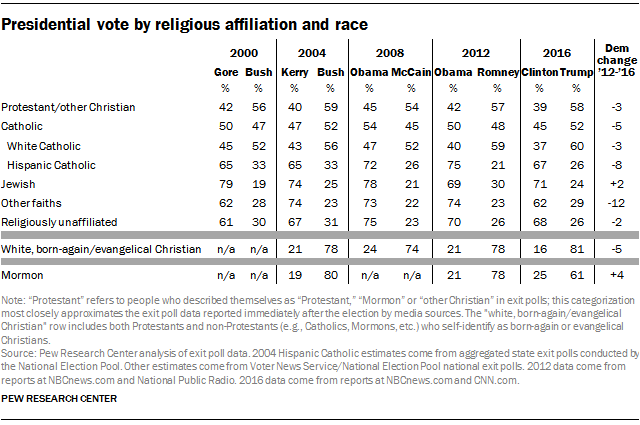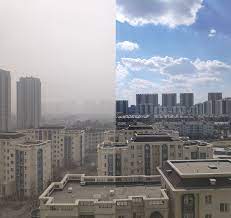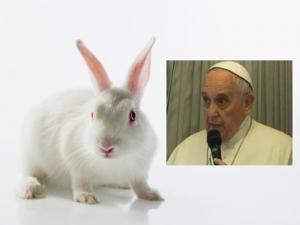We have been talking all week about healing and unity and reconciliation after a very surprising election. But I want to take a moment while our feelings are still raw to look at the numbers. Exit polls showed a strong showing among Evangelicals (81% voting for Trump). Some pollsters wondered if Trump, whose moral character is obviously completely at odds with the worldview of the so-called “moral majority,” would show a strong support on election day. They did, with a slightly higher percentage voting for Trump than did for Romney in 2012. Catholics too showed a slight increase in support for the Republican Party from 2012, with 52% voting for Trump compared to 48% for Romney in 2012. The Catholic vote is deeply divided not only on itself, but also shows a deep division when you look at white Catholics versus Hispanic Catholics, where the numbers are basically reversed. 60% of white Catholics voted for Trump; 67% of Hispanic Catholics voted for Clinton.
This surprises me, and I am curious if it surprises other readers. As a Catholic who reads and takes seriously Faithful Citizenship, I saw little that a Trump candidacy had to offer (I didn’t vote for Clinton, either, exclusively because of her stance on abortion. I chose the independent Evan McMullin instead). I expected to see some Catholics and Evangelicals choosing Trump as a lesser of two evils kind of candidate, but to see virtually no change in the data from 2012 to 2016 is, quite frankly, ponderous. Donald Trump has had multiple marriages, a very public recent scandal involving allegations of sexual assault, a recorded admittance to engaging in sexual assault, open support for gay marriage, and complete silence on other so-called “non-negotiables” like assisted suicide (which was on the ballot in one state this year, and passed). He paid lip service to the pro-life constituency but had very little concrete to offer, besides an opinion that Roe would be overturned automatically after his appointment of Supreme Court justices. Among Trump supporters, over 60% don’t think he is fit for office.
First, what I want to know is what would change these numbers? Personally, if Clinton had been operating under pro-life assumptions, even if her stance didn’t exactly align with my own, I would have voted for her in a heartbeat. I saw a lot of Catholic media trying to persuade Catholics that nothing positive in Clinton’s campaign offers a proportionate reason for voting for her because of her pro-abortion position. Is it possible that Democrats could shore up the Catholic vote if they adopted a pro-life stance? Would we see 75, even 85% of Catholics turning out for a pro-life Democratic platform?
Second, I want to know why we don’t see more third-party support among those with strong Christian religious affiliations. It is clear to me that neither party aligns with Christian values, especially when it comes to Catholics who have explicit principles guiding political participation, as we see in Faithful Citizenship. Yet, I continue to see Christians generally and Catholics specifically choosing one of the two parties to throw their support behind. I spoke to a Catholic this week who said basically that her vote will always be a vote against Democrats so long as they continue to support abortion rights. She doesn’t think of herself as Republican, but she votes down ballot Republican simply to undermine Democrats. This is interesting because, while abortion is obviously an important political issue (the most important, I’ll grant), I don’t think the church’s guidance supports making this the only issue that motivates political participation, much less supports turning a vote into anything to undermine the other pro-abortion party. I wonder how Catholics will have any influence on public life so long as their vote is so tied up in the two-party system.
Catholics and Evangelicals have so much to bring to the public square, and while I can’t speak for Evangelicals, I do think Church leaders do a good job guiding the faithful to recognize their political responsibility to promote the common good in more ways than simply opposing abortion. So why don’t Catholics show a stronger showing in voting for a third party?
Finally, I want to know why there is such a radically different political stance between white and Hispanic Catholics and what can be done about it. Last year, I lived in Austin TX in a community almost exclusively consisting of Catholics in this country illegally. These people live in constant fear of deportation for themselves or their family members. It makes sense to me that Hispanic Catholics would oppose Trump (though a quarter of them still voting for him boggles my mind), but I don’t understand white Catholics who worship in an increasingly Hispanic Church not also shifting away from Trump in solidarity with our Hispanic sisters and brothers.
So, contributors and readers, help me make sense of the data. What is it going to take to change the Catholic vote?





Beth,
A couple of things jumped out at me in your commentary. But I want to address just one. Why do you speak of pro-abortion vs pro-life? It is pro-choice vs pro-life. I grant you that many pro-choice people are simply pro-abortion but there are far too many pro-life people who are simply anti-abortion and not at all pro-life in the way that our Catholic faith teaches us.
In order to vote for a pro-life person I must see in their policies and decision making a fully pro-life stance that is not just anti-abortion. That includes taking a stance in favor of accessible healthcare, living wage jobs that support families, a clean and safe environment which includes healthy food for people at all income levels, clean water and an environment fit for creatures, good schools and affordable childcare, and support for women and children who are by far the largest group who suffer from poverty. To vote for the pro-life candidate who is simply anti-abortion because it gets people to vote for them while the rest of their policies do nothing to address the issues that lead women to choose to end a pregnancy is quite misguided in my opinion. The way to end abortion is to create a really pro-life world — but that takes real effort, dollars and a willingness for people to fund the causes that create such a world. Most people want the easy way. I am Catholic. I voted for Hillary Clinton because she stands for more of the policies that are pro-life than any of the other candidates. I am wise enough in my old age… grandmother to many –to know that ending legal abortion does not end abortion. It punishes women and makes a few people feel self righteous.
Thanks for letting me have my say.
Elena, I agree that pro-life people should often really be called anti-abortion people, and I most certainly agree that being pro-life is comprehensive, which is why I can’t understand how so many Catholics, with such a rich view of life and all the ways we are called to protect it voted for Donald Trump. I think abortion is important enough that I wouldn’t necessarily vote for a candidate who supported abortion rights if I could possibly help it, but my whole argument about Trump is that he really doesn’t have anything to offer to those motivated by comprehensive pro-life sentiments. I don’t think he really has much to offer to those who think of life narrowly as simply opposing abortion. It is not listed as an issue on his website that he is concerned with. Besides the third debate, he really never talked about a plan for ending or even reducing the number of abortions. How he got 52% of the Catholic vote is beyond me. As for your comment about ending legal abortion as a punishment to women, well, that is another post entirely! Thanks for your thoughts.
I’ve been lurking here for awhile, and this post compelled me to create an account. Thank you for examining these questions. I see two assumptions that you made which I disagree with, which I think may offer some insight into the answers to those questions.
1) “I do think Church leaders do a good job guiding the faithful to recognize their political responsibility to promote the common good in more ways than simply opposing abortion.” Completely disagree. While the guidance is out there, it is not what the average Catholic in the pews is hearing unless they seek it out. Far more common to hear priests and bishops speak only and exclusively about opposing abortion. Abortion, for a lot of lay Catholics – at the urging of their priests and bishops – is the first and only litmus test for a candidate, and an easy way out in a tricky election like this one.
2) “…I don’t understand white Catholics who worship in an increasingly Hispanic Church not also shifting away from Trump in solidarity with our Hispanic sisters and brothers.” I do. Once again, thinking of the average white Catholic in the pews, they are NOT worshiping in an Hispanic Church. At least where I live, there are the parishes that have only Spanish Mass (primarily Hispanic worshipers), the parishes that have only English Masses (primarily white), and a handful of parishes that offer both. It is entirely possible, even in heavily Hispanic Texas, to live surrounded by our Hispanic brothers and sisters and never worship with them. Beyond that, church often “feels white” even when the congregation is more mixed – music from European traditions, references to European saints or mainstream American pop culture, etc. A question we might ask ourselves is how we the church are incorporating and honoring the experiences of Hispanic Catholics in our pews.
Thanks for responding, Frances! I was hoping for a vigorous conversation. It is fascinating to me how different perceptions are. As far as your #1, my experience is that the leadership (i.e. the clergy) tend to be pretty balanced, but the faithful in the pews crave a clearer, more direct approach to issues like abortion. In my parish, several people started circulating youtube videos of priests taking “strong stances” comparing abortion to slavery and genocide, and bemoaning the fact that our own priests don’t do the same. Much of this is a matter of perception. I feel like maybe I have been lucky. I wonder though if maybe lay groups that circulate viral videos like this one aren’t maybe skewing the perception of the clergy? And as for the bishops, I know that this round of Faithful CItizenship wasn’t stellar, but it still lays out a more comprehensive platform than just “do anything you can to get a pro-life person in office.”
2. Good point. I live in super white suburban mid-west now and there are few Hispanics at my church, though there are in fact some. But when I spoke about a Hispanic church, I meant the American church more than the local parish. Over a third of US Catholics are Hispanic. Immigrants are more likely to be Catholic, e.g., according to Pew’s study as well. So I think you are right to say that we don’t necessarily worship in the same building as our Hispanic brothers and sisters but how can we so overwhelmingly miss that we are in the same church? I like your point about honoring the experience of Hispanic Catholics. What are some concrete ways we might do that without being theatrical or paternalistic?
Thanks for the thoughtful article Beth, and for the included election facts.
I remain utterly baffled as to why so many highly educated, very intelligent, good Christian people feel abortion is the most important political issue when….
1) 3,000+ nuclear weapons remain on hair trigger alert poised to erase all of Western civilization in less than an hour.
2) Science tells us that unchecked climate change will wreak havoc upon our children and grand-children’s future, a process already underway around the world.
3) Making abortion illegal won’t end abortion, but will only change the circumstances under which it takes place. Has making drugs illegal stopped drug use? Have laws and police stopped reckless driving?
It troubles me deeply that so many of the brightest moral minds among us are apparently not troubled by the fact that we just finished a year long Presidential campaign and the very real Biblical scale existential threats facing our nation and the world were barely mentioned.
It troubles me deeply that so many of the brightest moral minds among us willingly voted for (or at least not against) a proudly self confessed sexual predator who is utterly unqualified to address either of these existential threats.
It troubles me deeply that so many of the brightest moral minds among us think it’s more important to use their vote to make a satisfying statement about abortion, a problem which we actually don’t have the power to meaningfully effect with laws.
This is NOT a pro-choice argument.
It’s a pro-sanity argument.
We have literally lost our minds, and it’s only when we can see that and say it out loud that our healing will begin.
Given the sincere and well intentioned concerns many people of faith have about abortion, it seems constructive to explore ideas that would help protect the unborn, without resorting to radically risky solutions such as voting for Trump.
Before I offer one such alternative, I ask readers to reflect upon the following cliche. “If the things we want to hear could take us where we want to go, we’d already be there.” With that warning in place, here’s a suggestion for protecting the unborn that would work, but that we may not want to hear.
1) Sell the very many multi-million dollar church buildings.
2) Use the money to build orphanages.
3) Offer to raise children who are not wanted by their parents.
At the least, such a suggestion would seem to pose a clarifying moral question. Which is more important to us, getting to enjoy a beautiful building for an hour on Sunday, or saving the lives of the unborn?
Jesus never led a church construction fund drive. There’s nothing about the fundamental principles of Christianity which require the construction of expensive buildings which sit empty most of the time.
What is our real interest? Saving the lives of the unborn? Or making satisfying moral proclamations on that topic?
What does Christianity teach us? What we ourselves should do? Or what we should be lecturing others to do?
Are we looking to the Supreme Court to protect the unborn because we are unwilling to use the power we ourselves already have to protect them? Did half of Catholics and most evangelicals vote for Trump hoping he would do what they are unwilling to do themselves?
Hello, Beth! I just wrote a guest blog post that looks more deeply at the white/Hispanic Catholic vote… hope it helps with your final question!
http://catholicmoraltheology.com/understanding-the-catholic-vote-white-and-hispanic-catholics-in-2016/